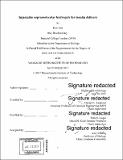Injectable supramolecular hydrogels for insulin delivery
Author(s)
Xue, Kun,Ph. D.Massachusetts Institute of Technology.
DownloadFull printable version (11.44Mb)
Other Contributors
Massachusetts Institute of Technology. Department of Biology.
Advisor
Daniel G. Anderson and Robert Langer.
Terms of use
Metadata
Show full item recordAbstract
Treatment of diabetes for Type 1 and subsets of Type 2 diabetes require the delivery of the hormone insulin to maintain appropriate blood glucose concentrations, and current methods involve frequent insulin injections. The key goals for insulin therapy include prolonging release to reduce frequency of injections as well as glucose-responsive release to account for meal-time blood glucose fluctuations. There is a need for injectable carrier systems which can show therapeutically relevant insulin delivery to the body. Here, we develop injectable shear-thinning hydrogel systems as a depot for modulating the release of insulin. We have used supramolecular hydrogels created from cyclodextrin-adamantane mediated dynamic crosslinking of hyaluronic acid and show that these hydrogels can form an injectable depot in vivo. We further demonstrate that by changing the molecular weight and concentration of the individual polymers, release both in vitro and in vivo can be modulated. The possible mechanistic basis for the different release properties is probed by mechanical rheology. These hydrogels are further investigated for their feasibility for inclusion of particles and for biocompatibility. The gels can be combined with protein-based insulin particles made within the lab to extend the release duration both in vitro and in vivo. The gels also show biocompatibility in the subcutaneous space in vivo over the period of one month. Novel hydrogels can be formed by the combination of one polymer from the original hydrogel with PBA polymers from the lab, and these hydrogels are investigated for their glucose-responsive properties. We also test other systems for their potential glucose-responsiveness. Taken together, the work presented here applies recent advancements in supramolecular hydrogels for the purposes of drug and insulin delivery.
Description
Thesis: Ph. D., Massachusetts Institute of Technology, Department of Biology, 2017 Cataloged from PDF version of thesis. Vita. Includes bibliographical references.
Date issued
2017Department
Massachusetts Institute of Technology. Department of BiologyPublisher
Massachusetts Institute of Technology
Keywords
Biology.